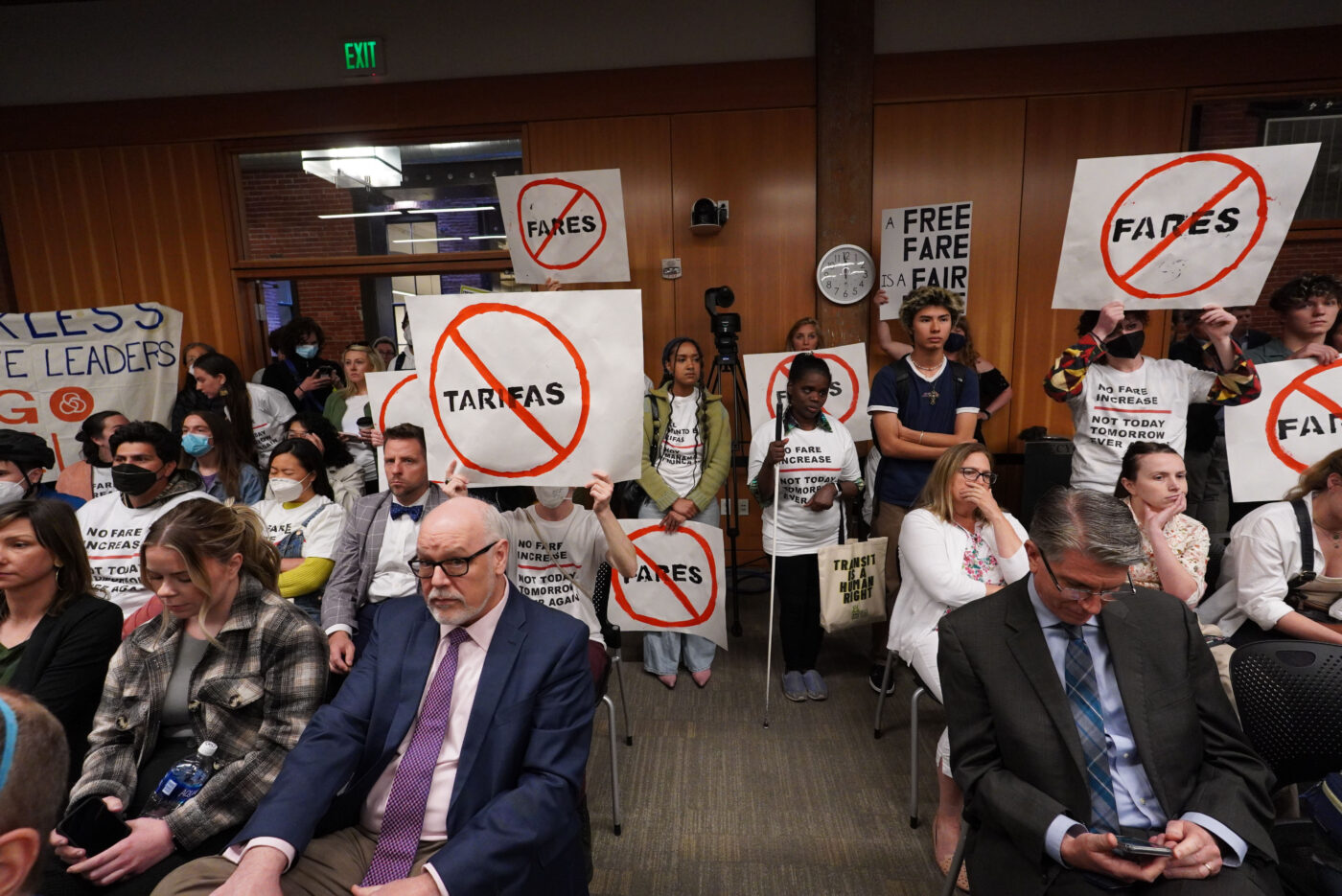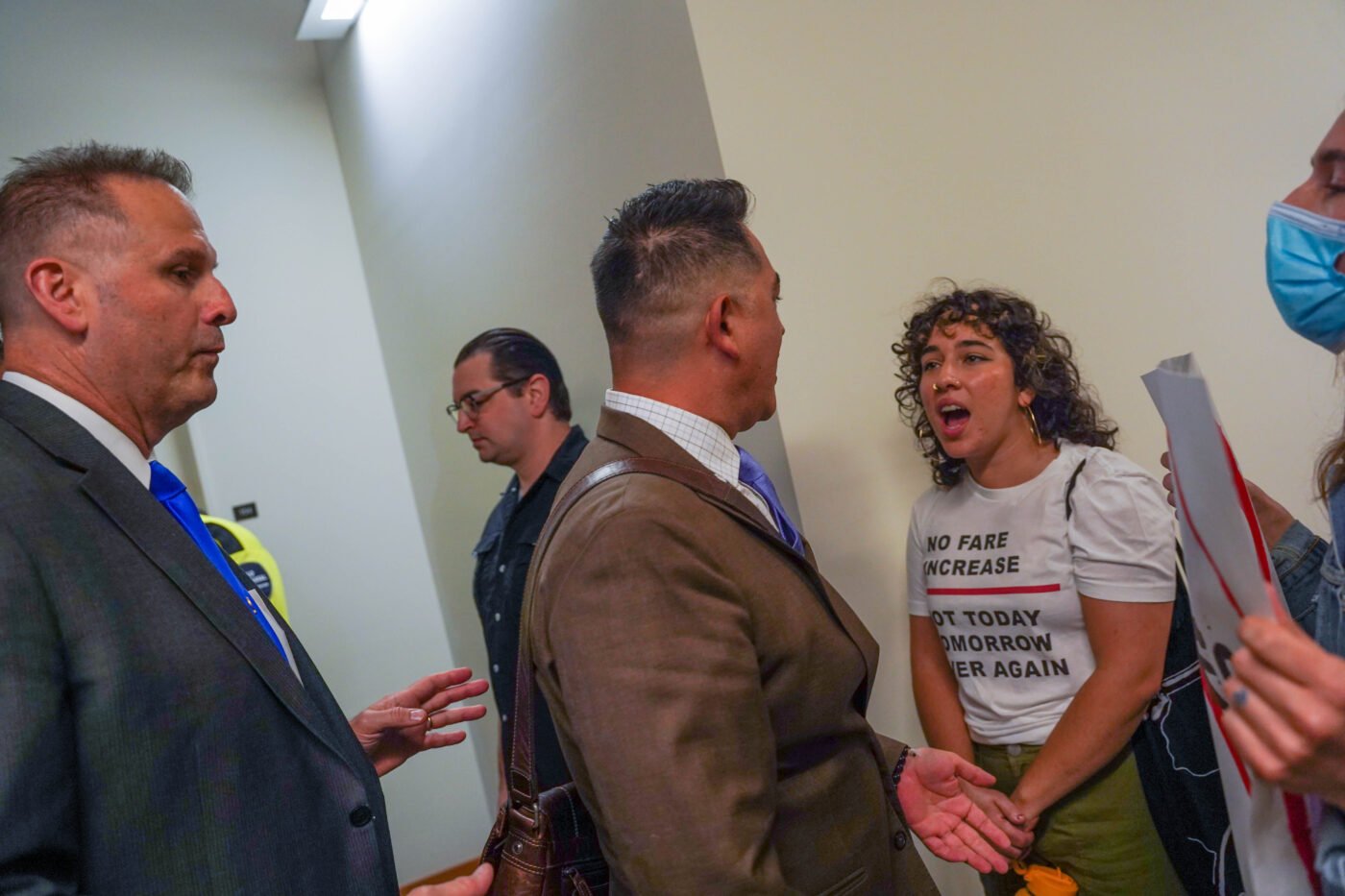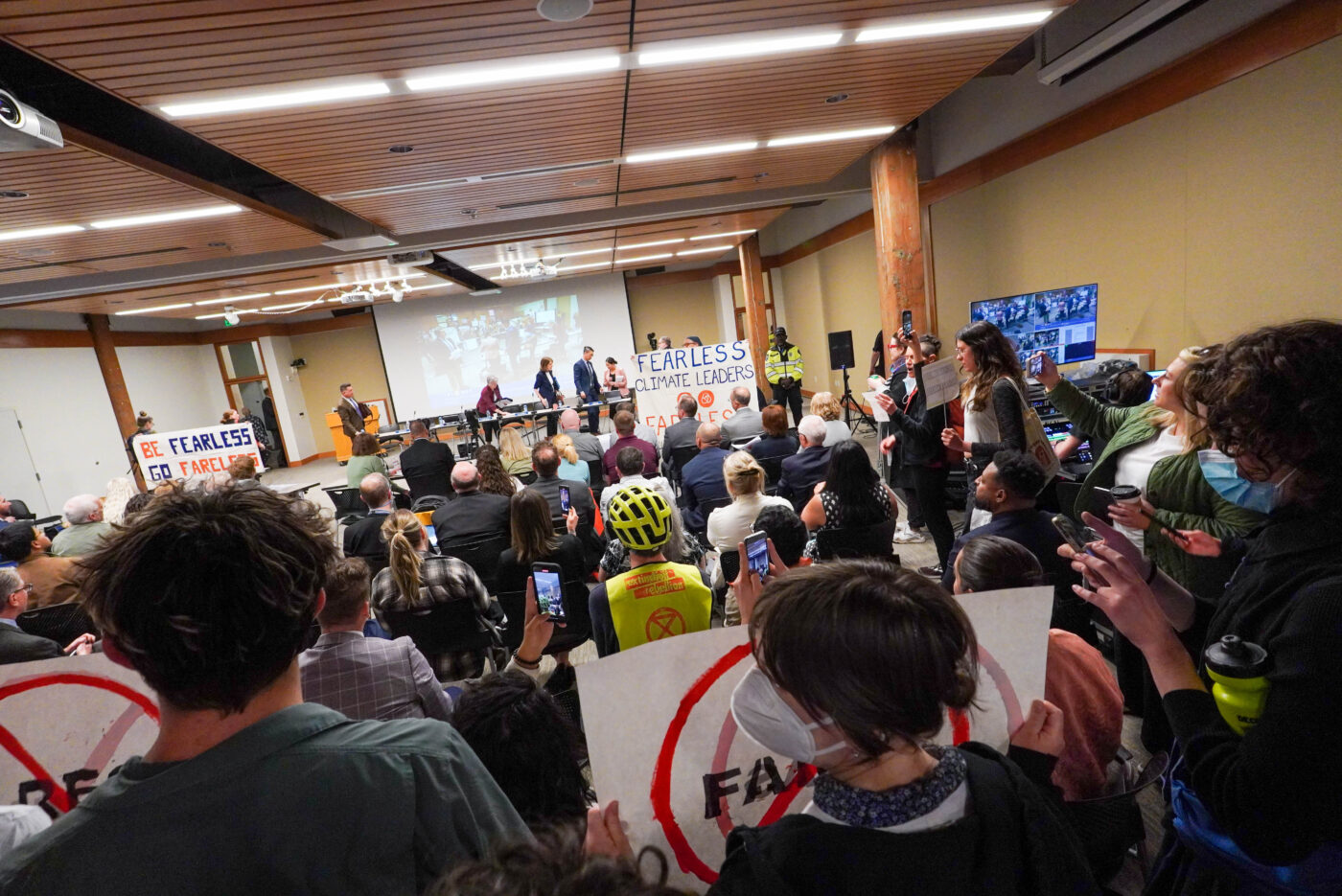
TriMet’s seven-member, unelected board of directors voted to enact a 30-cent fare increase at their meeting in downtown Portland today by a vote of 6 to 1; but not before a raucous crowd of protestors led them to adjourn the meeting several times and they ultimately finished the meeting behind closed doors with several security guards standing outside.
The banging of protestors’ arms against the walls of the room could be heard clearly in the livestream. “Cowards! Face us! Cowards! Come out!” they shouted.
A wide range of people — from high school students to working moms and retirees — who oppose the fare hike, say it’s a short-sighted fix to a larger, systemic funding problem, and its impacts will be felt most by the people who can least afford it. The increase and the aggressive fight against it, is set against a backdrop of a climate crisis, flagging transit ridership, and skyrocketing food and housing costs. For their part, TriMet says the increase will help them keep pace with operating expenses that have risen by 4.2% per year for the past decade. Without higher fares and the estimated $4.9 million per year that would come with it, TriMet says service would only get worse.
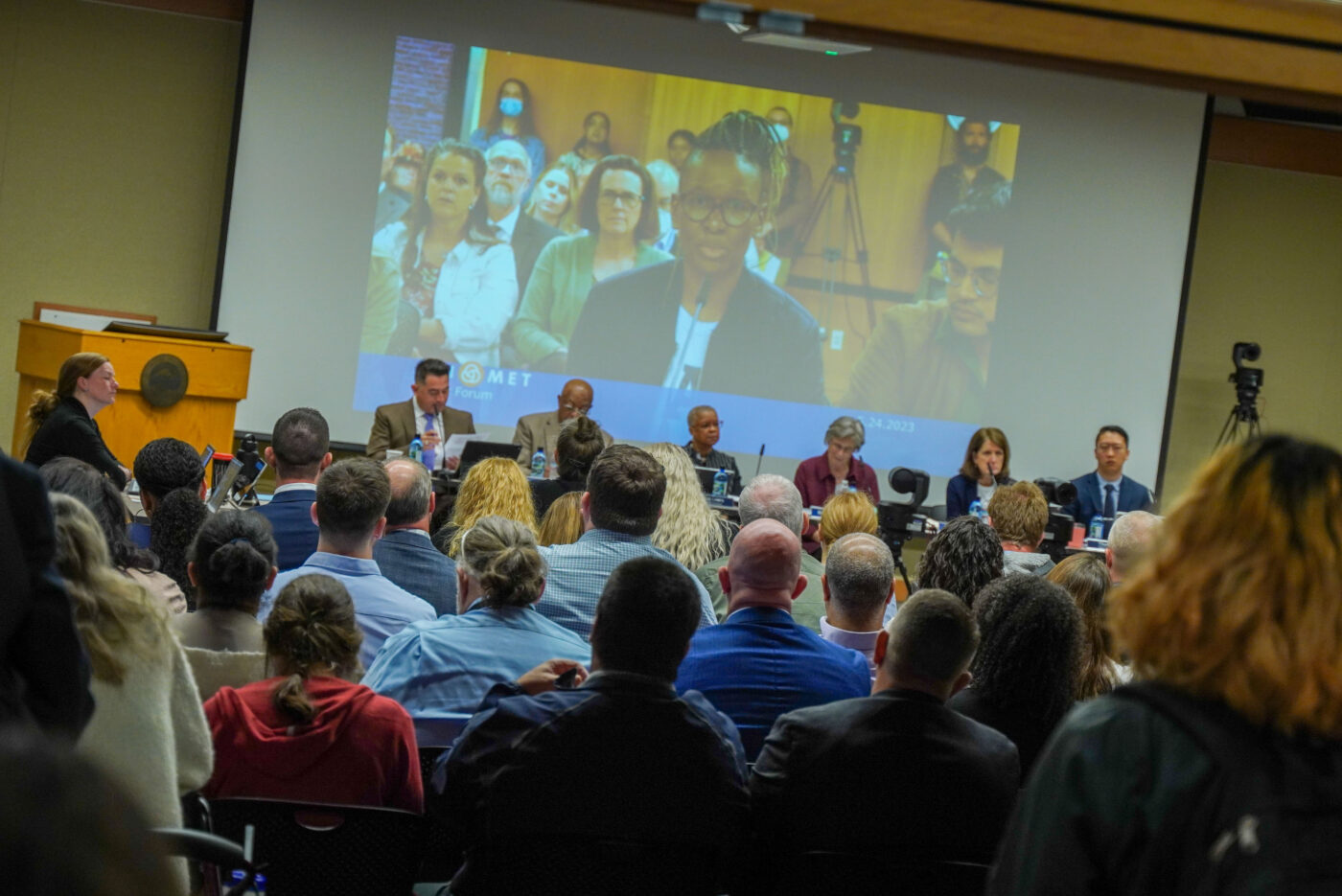
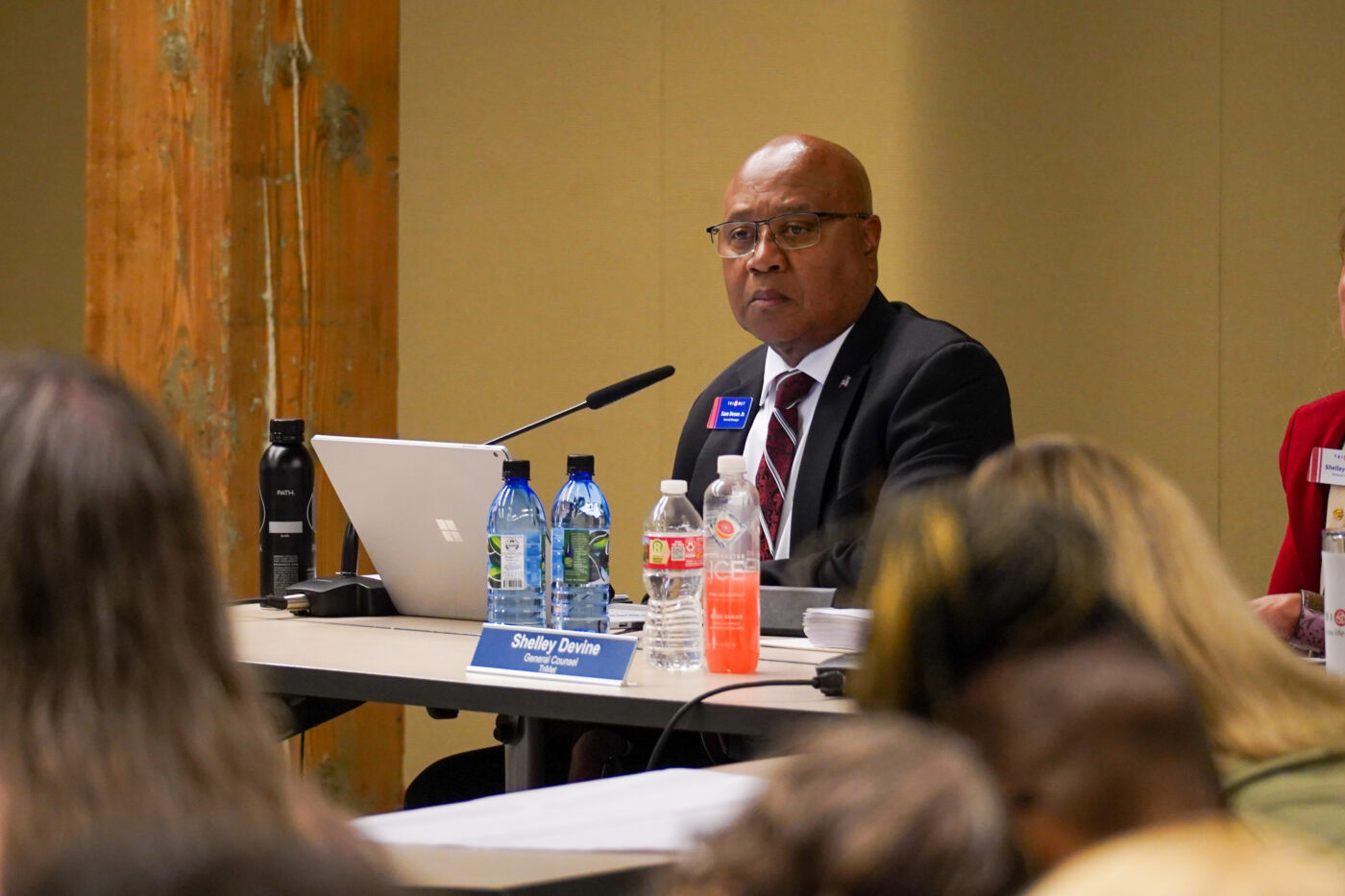

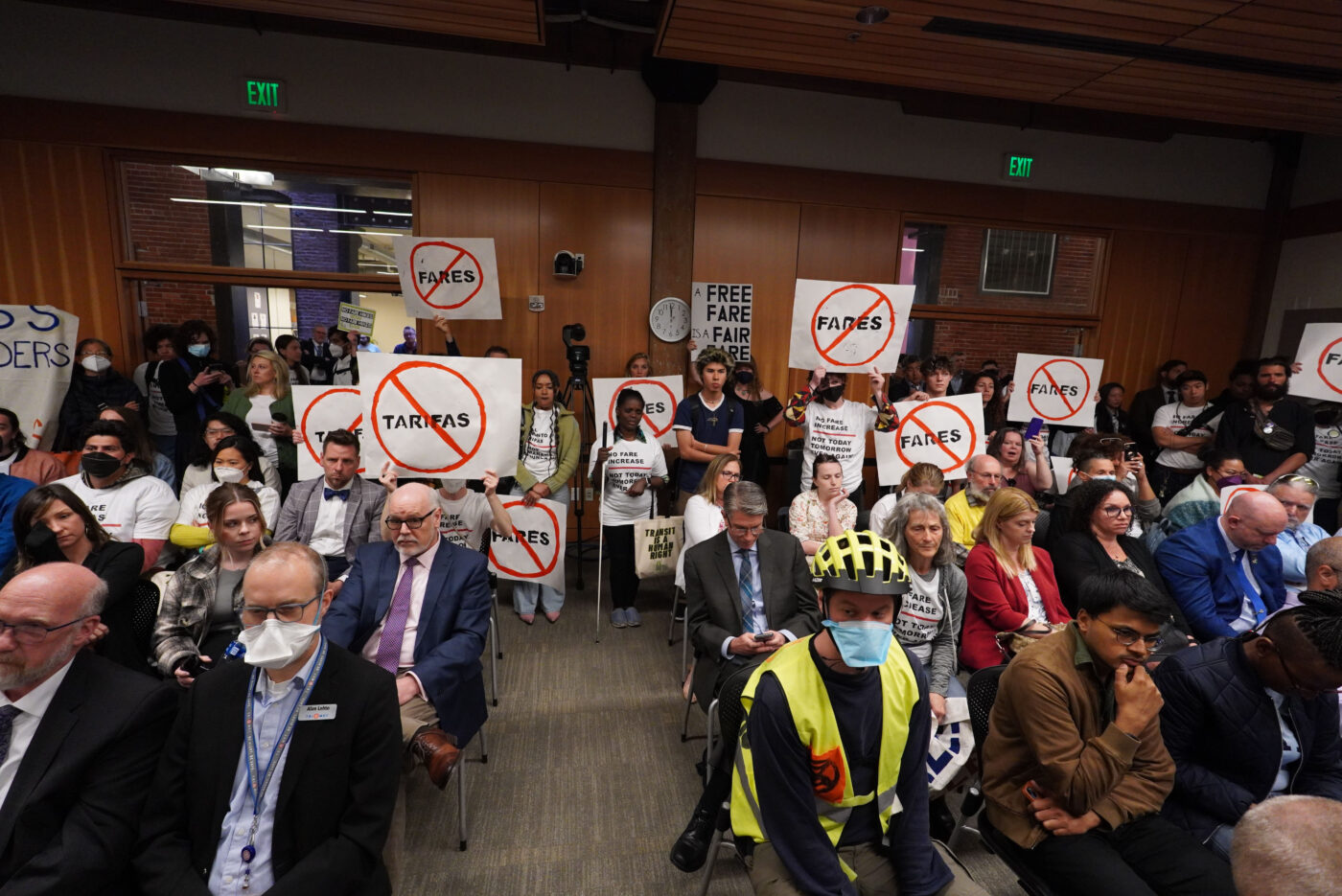
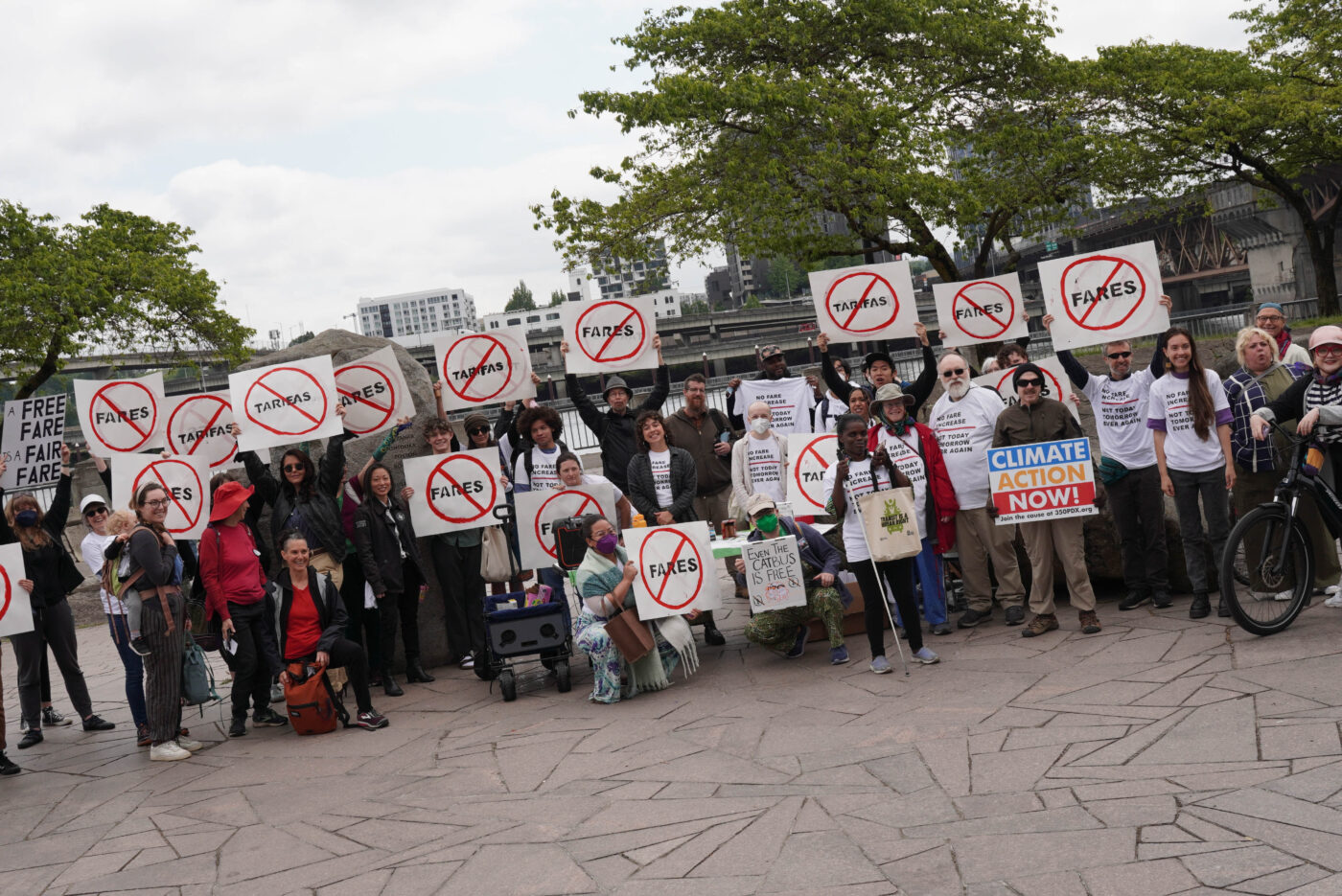
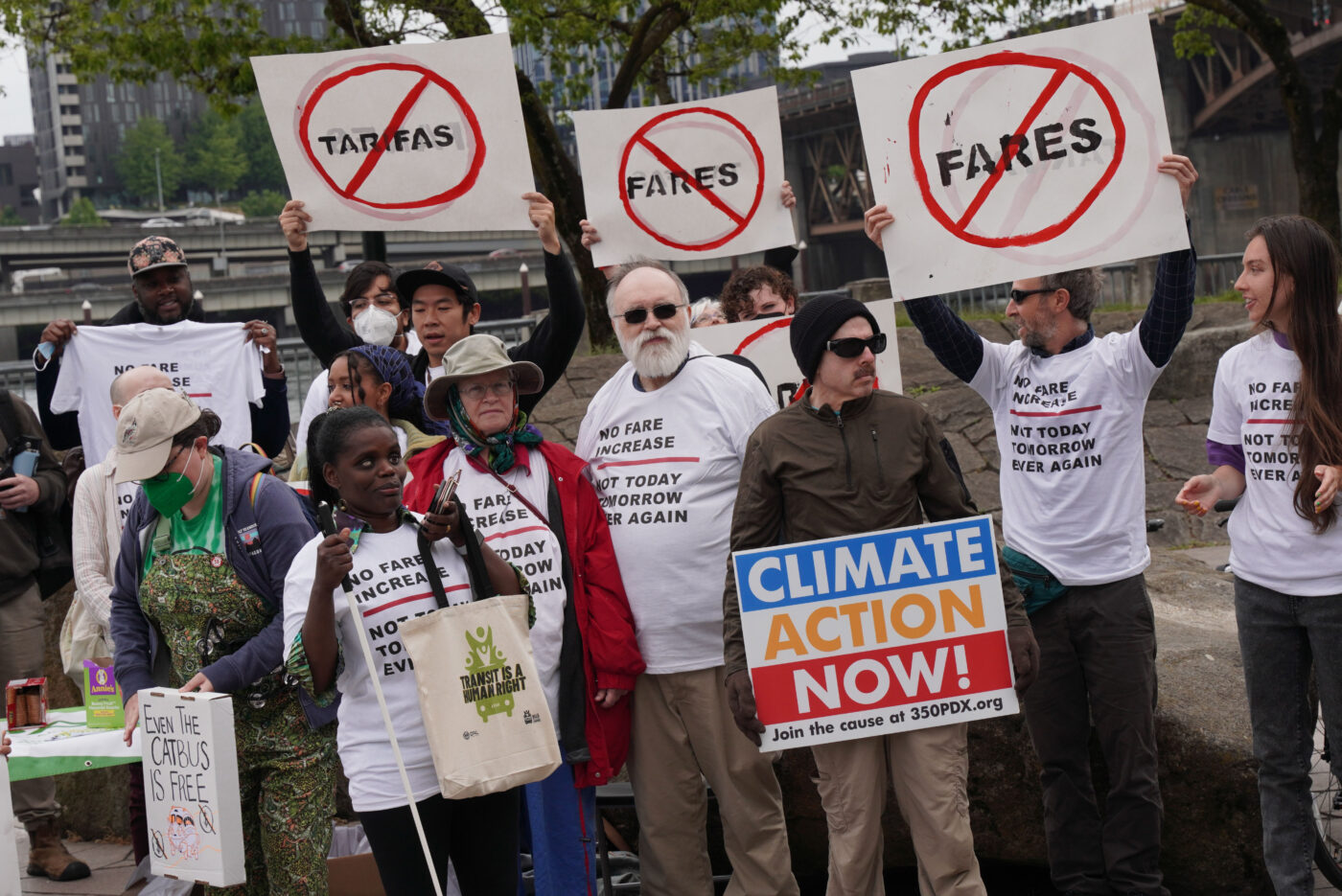
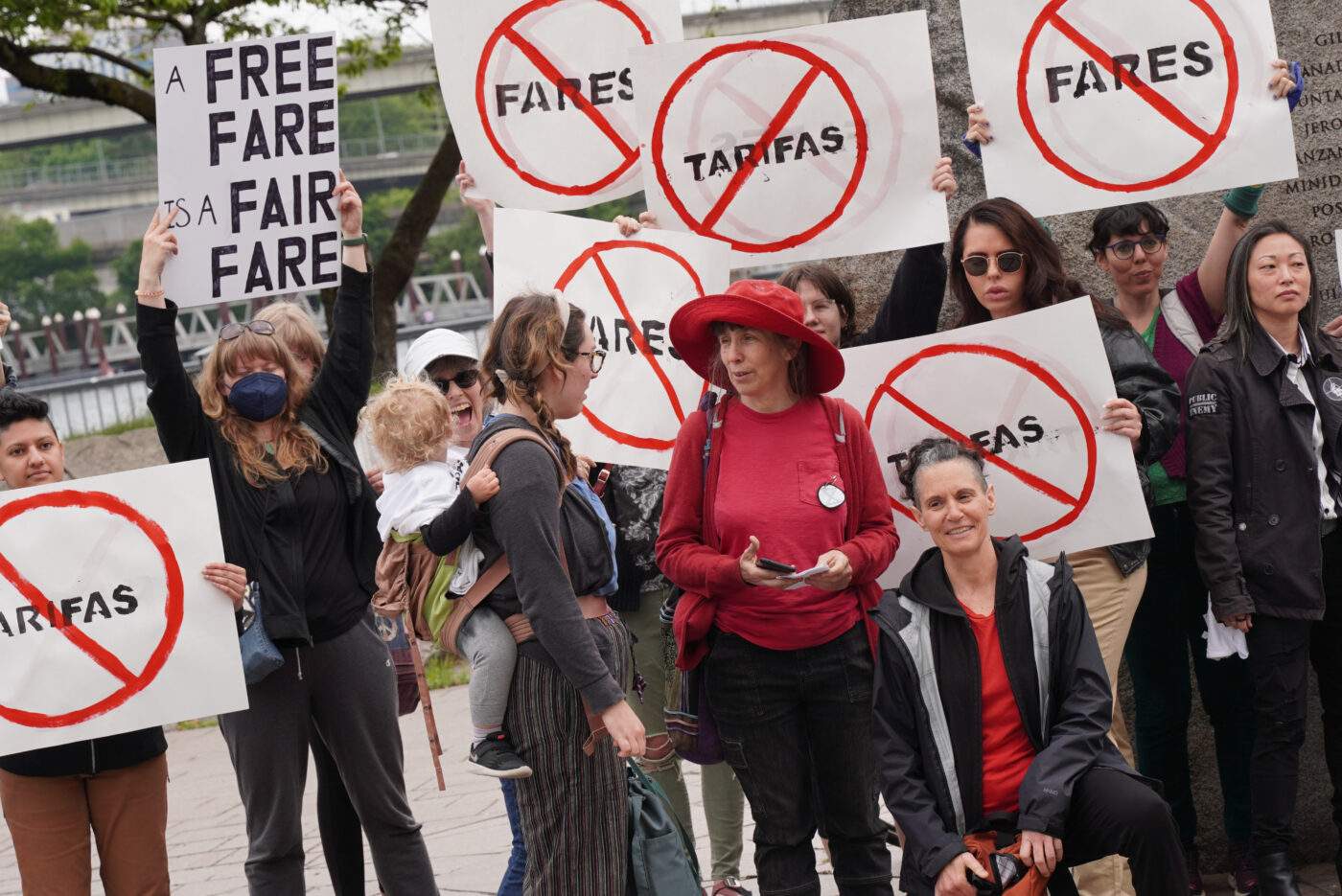
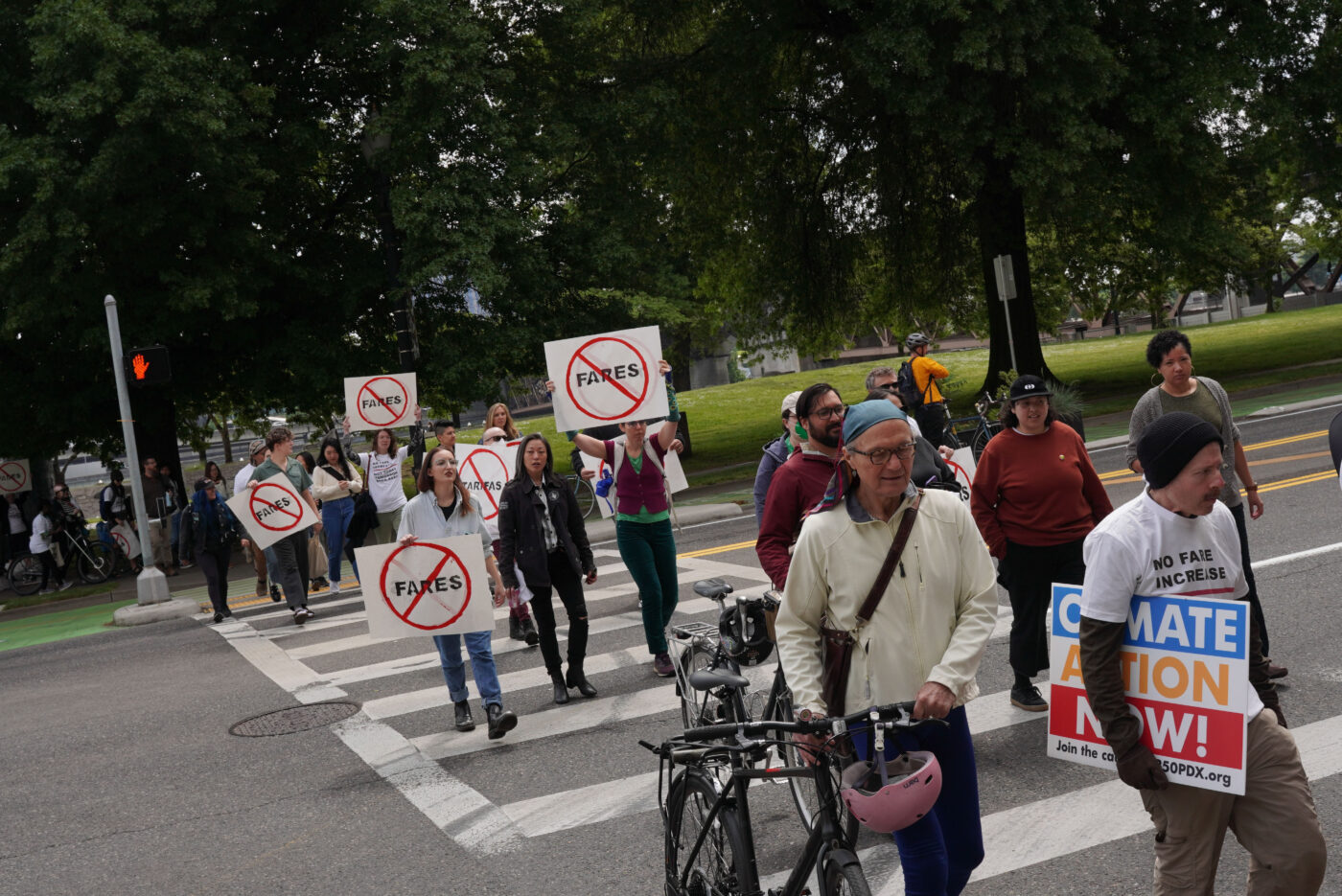
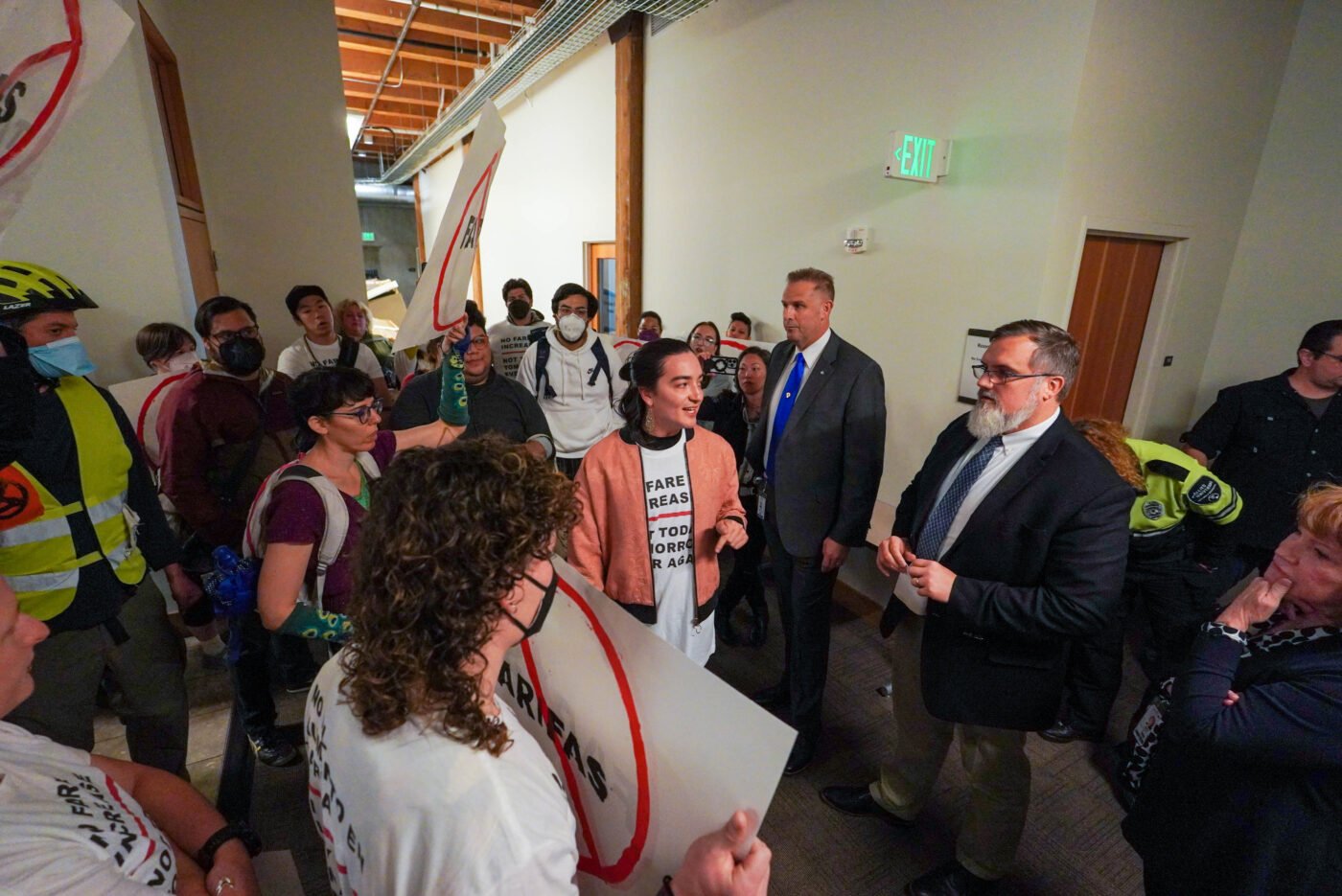
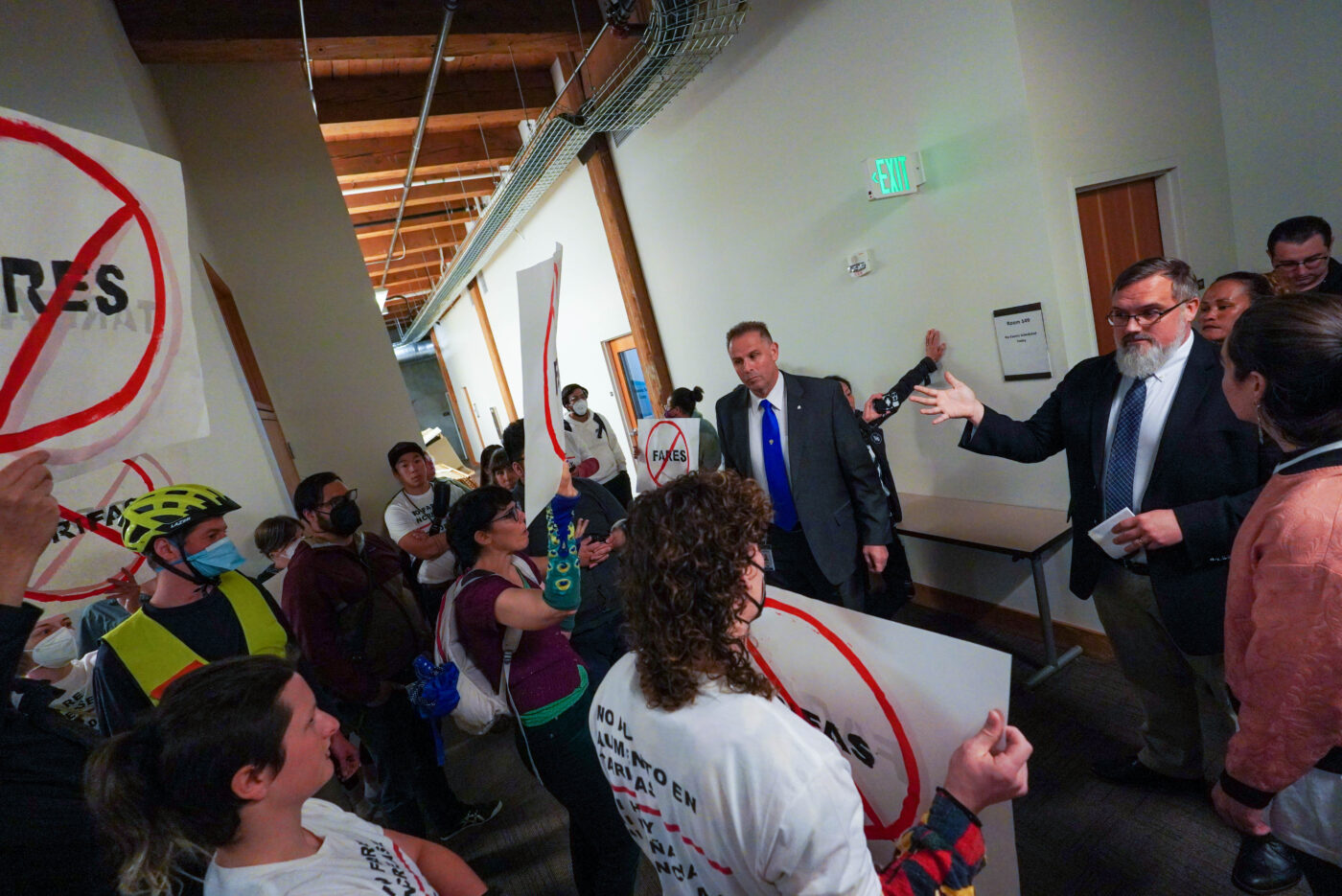
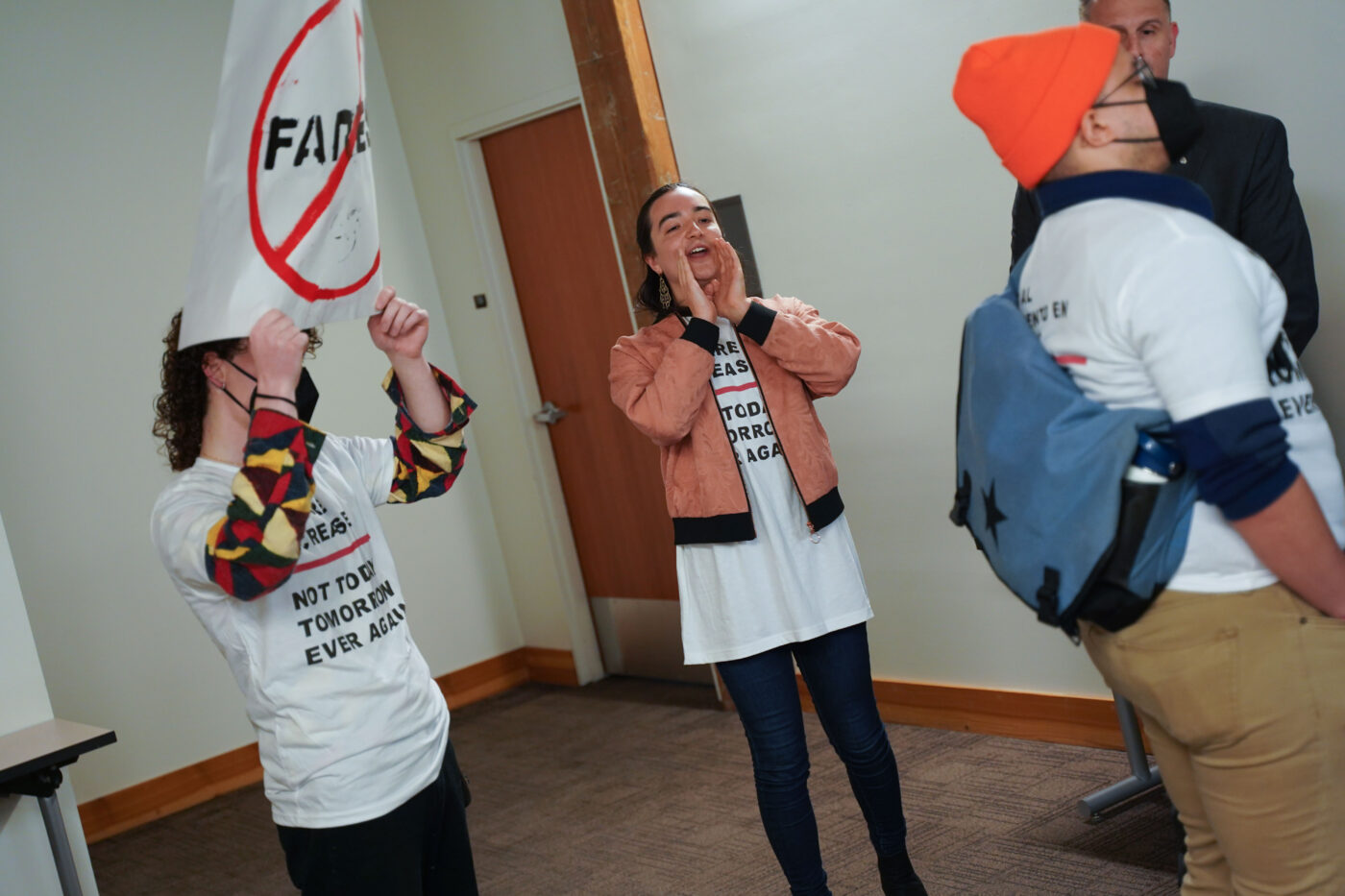
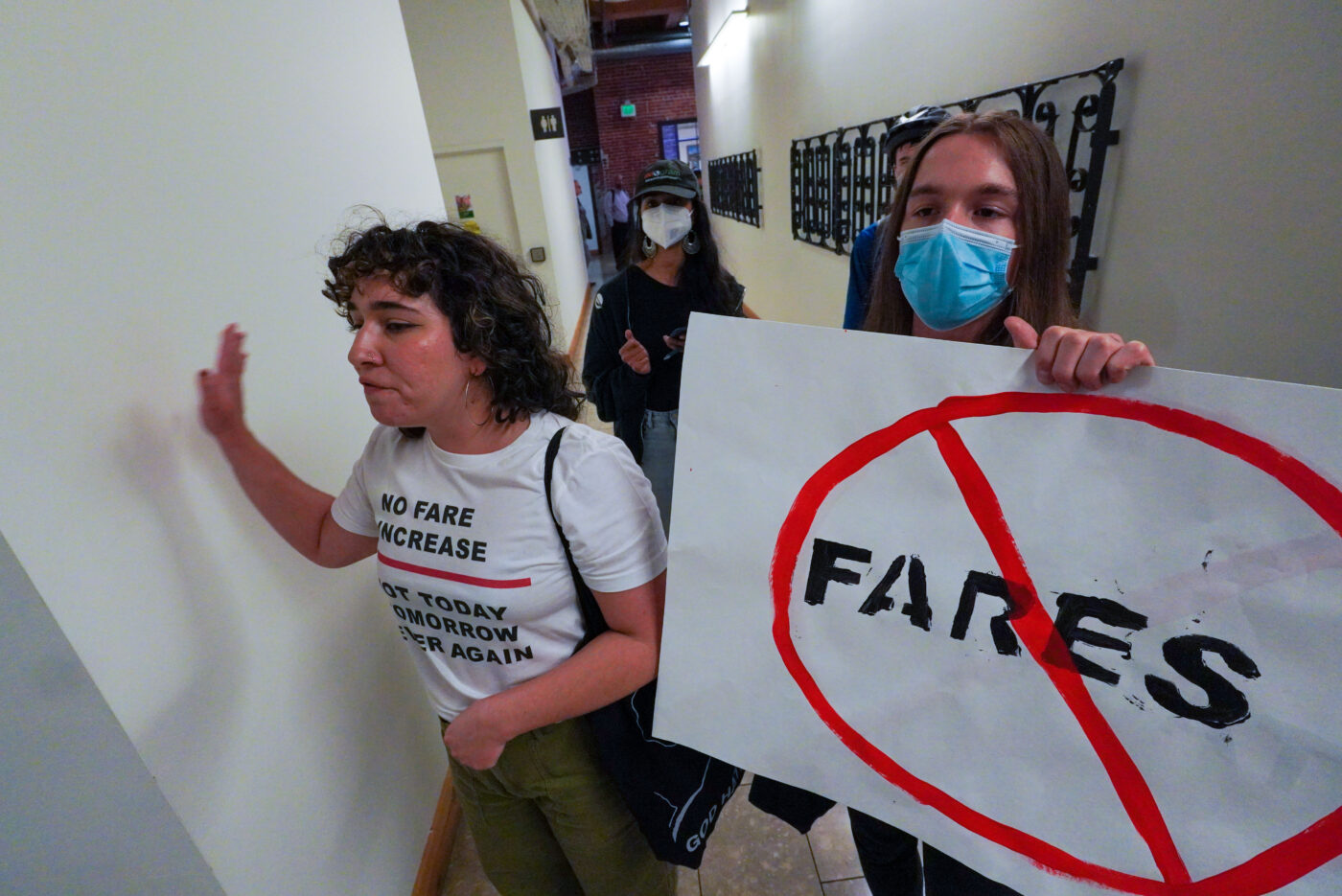
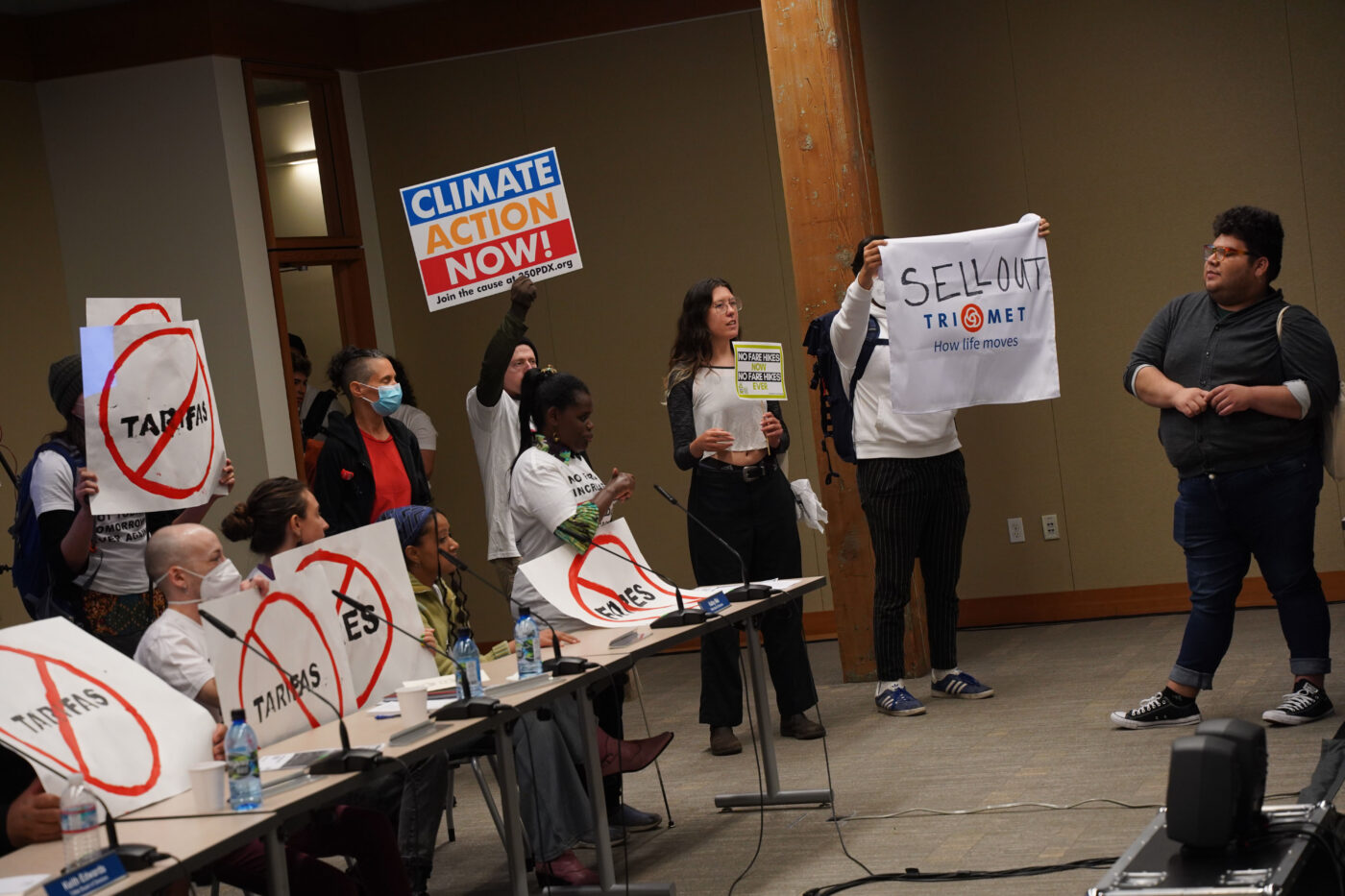
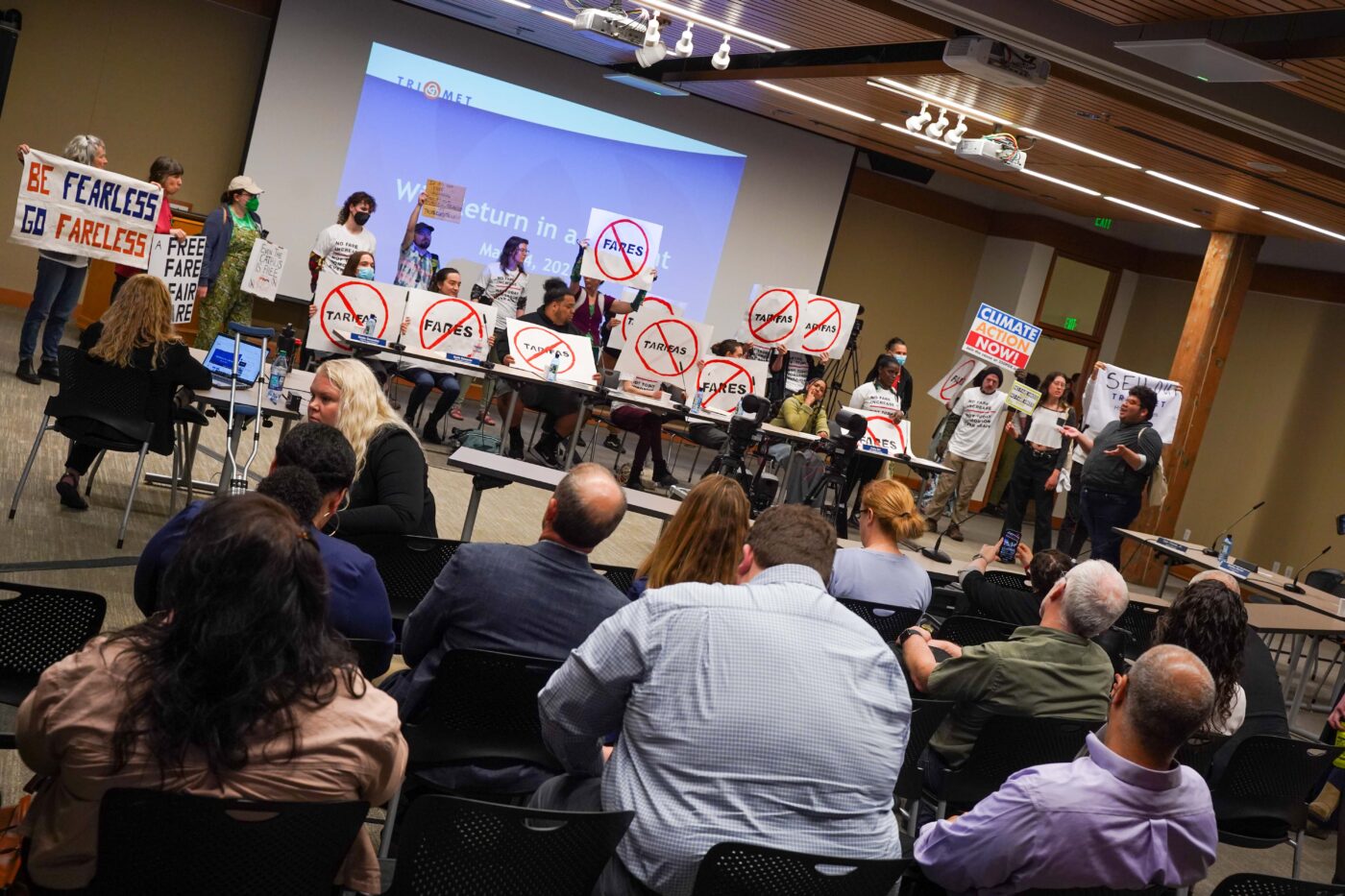
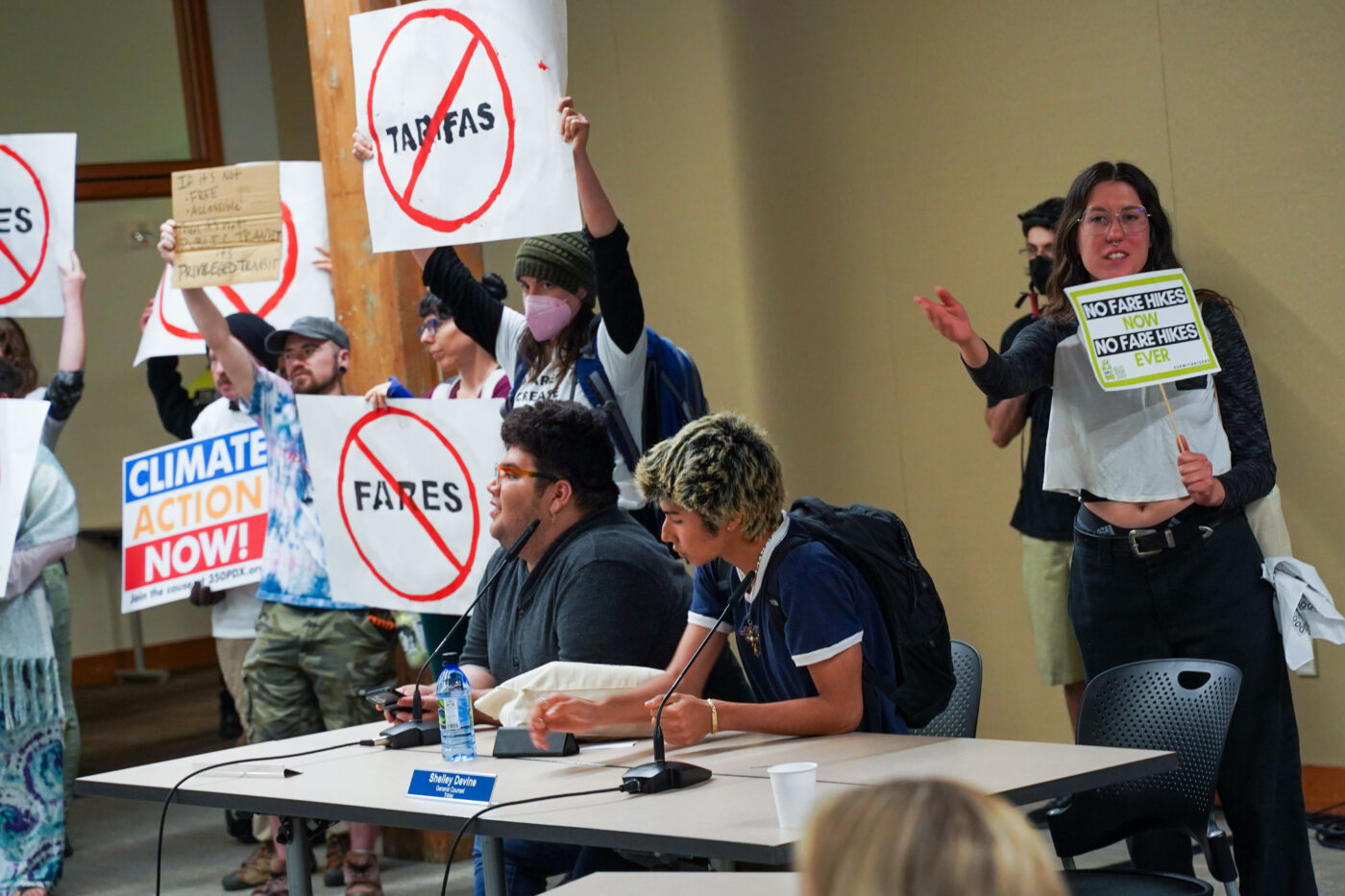
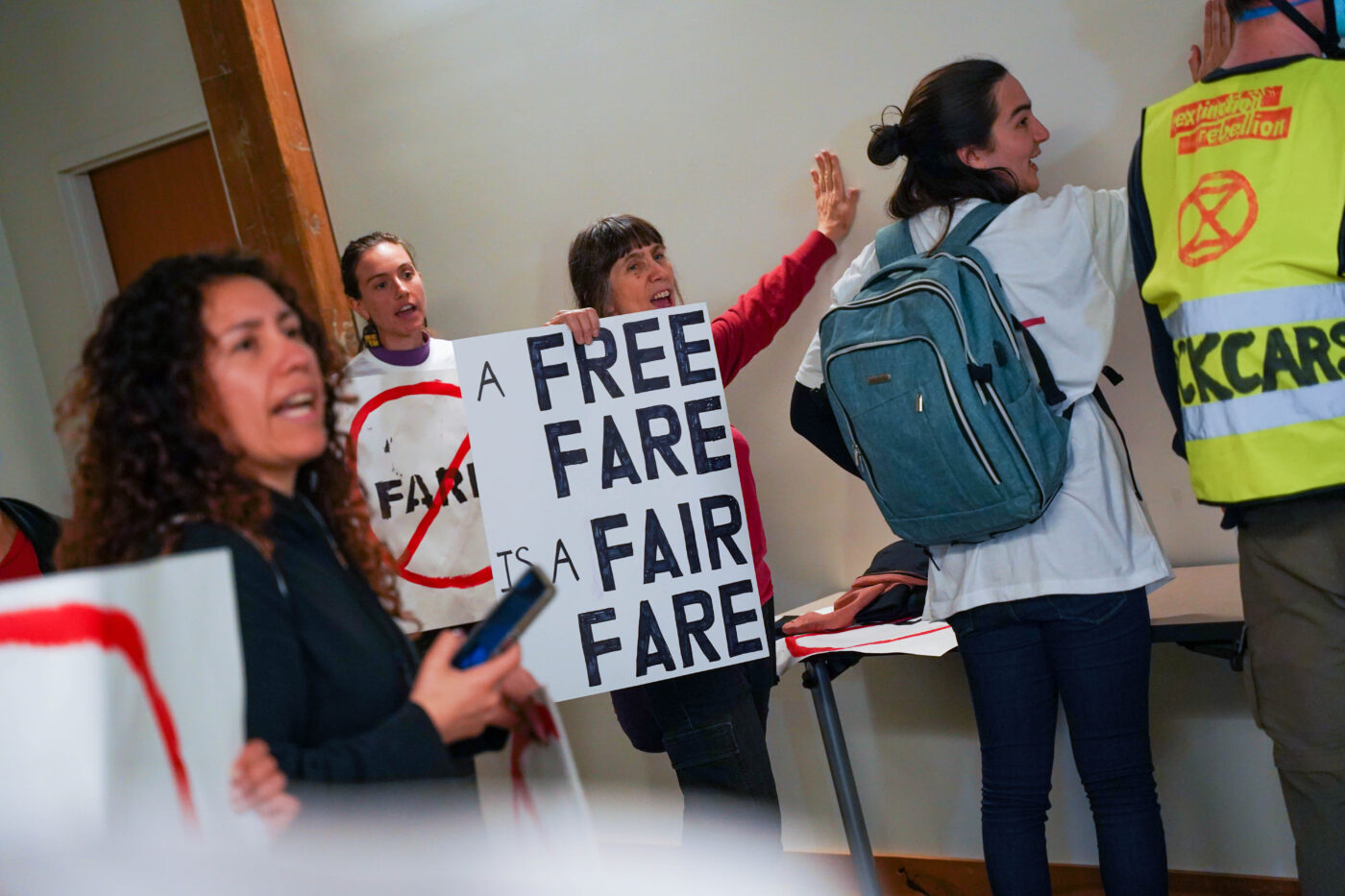
The meeting was held at the University of Oregon campus in Old Town. It opened with public testimony — much of it opposed to the fare hike ordinance (number 374) that was on the agenda. The first person to testify was Oregon State Representative Khanh Pham. “Unfortunately, this fare increase appears to be a temporary budget bandaid that ultimately hides the larger systemic problems that TriMet must begin to tackle to be the transit agency of the 21st century that we need,” Pham said.
Pham and many others (including TriMet board members) acknowledge that farebox revenue isn’t an ideal way to fund a strong transit system and that a new approach is needed. The approach many people said they want is for TriMet’s board to be more bold and aggressive in their pursuit for other revenue so that fare-payers aren’t subject to so much of the budget burden.
“As a transit board,” Pham urged in testimony she gave from her office at the State Capitol in Salem, “You have the opportunity to set the tone for a more assertive approach… a more aggressive approach to… plan a generational investment in public transportation.”
Transit advocates with OPAL Environmental Justice Oregon told the board that a fare increase would worsen public health, fewer people on transit, more carbon emissions, traffic deaths and social isolation. Several people who testified pointed out that TriMet’s own analysis showed that the fare hike would have a disparate impact on lower-income people and that a majority of riders surveyed said it was a bad idea.
Mercedes Elizalde with Latino Network urged the board members to work harder to find funding from other sources. “TriMet has successfully avoided more financial burden on riders for more than a decade. This isn’t a problem to solve, this as a success story to live up to,” she said.
Meanwhile, across the street from the meeting in Waterfront Park, several dozen people assembled for a protest rally. The rally was organized by OPAL and their Bus Riders Unite campaign. The rally-goers strategized, put on “No Fare Increase” t-shirts, held up signs and made speeches. Retiree Amanda Briles told me she’s ridden TriMet since she was 15 years old.
“I really like TriMet and I really rely on it. And now that I have less income I’m really concerned about fares going up,” she said.
Climate activist Guy Berliner, who could be heard chanting “tax the rich” throughout the day, said he thinks the burden of this fare increase should fall on wealthier people. “I’m tired of watching the planet be incinerated and I see this as another step in the depraved, nonchalant, feckless attitudes of bureaucrats… looking for ways to patch their budget that will not offend the people who have the resources that they need to disgorge in order to make public services functional.”
Asked what he feels the next step should be if the fare hike passes, Berliner said, “I think we need about 1,000 people here instead of 40 people. We need many thousands of people to descend on them and scare the living crap out of them. That’s the answer. That’s the only way that changes ever come about.”
Berliner, Briles and the rest of the protestors then massed and timed a march across NW Naito Parkway to the meeting at the White Stag Building just as the fare hike ordinance was to be voted on. Almost as soon as the ordinance was introduced, protestors who filled the meeting room began shouting their disapproval. Minutes later, TriMet Board President Dr. Linda Simmons and her colleagues got up and walked out of the room. This was the first of several recesses taken because Simmons felt the yelling from attendees was not compatible with an open, public meeting.
Once back from recess, TriMet General Manager Sam Desue shared his remarks and the shouts from audience began again. Slowly at first, then they gathered frequency as a TriMet staffer made a presentation about why they felt the fare hike was justified. As the staffer went through her slides, protestors offered live fact-checks and opinions in strong disagreement. When it was finally time to hear how each board member would vote, they got through three sets of remarks before Simmons called another recess.
Board Member Kathy Wai (a community organizer who represents Clackamas County), was the only member to vote against the increase. “I think this is a premature vote that will dampen the future of collaboration — and I mean real and true transparency and collaboration between communities that are going to be the most affected,” she said.
Here are a few more snips from Wai’s remarks:
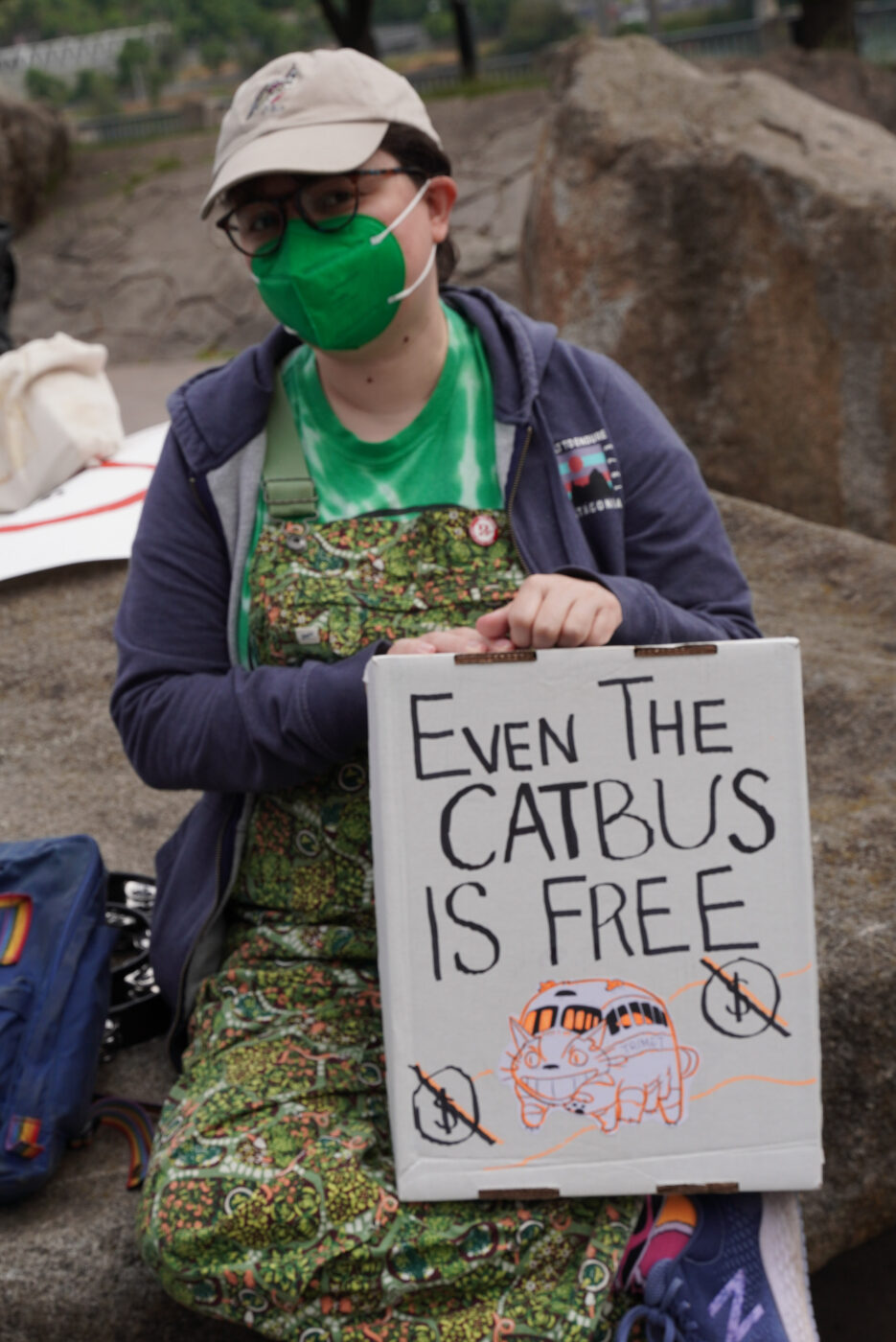

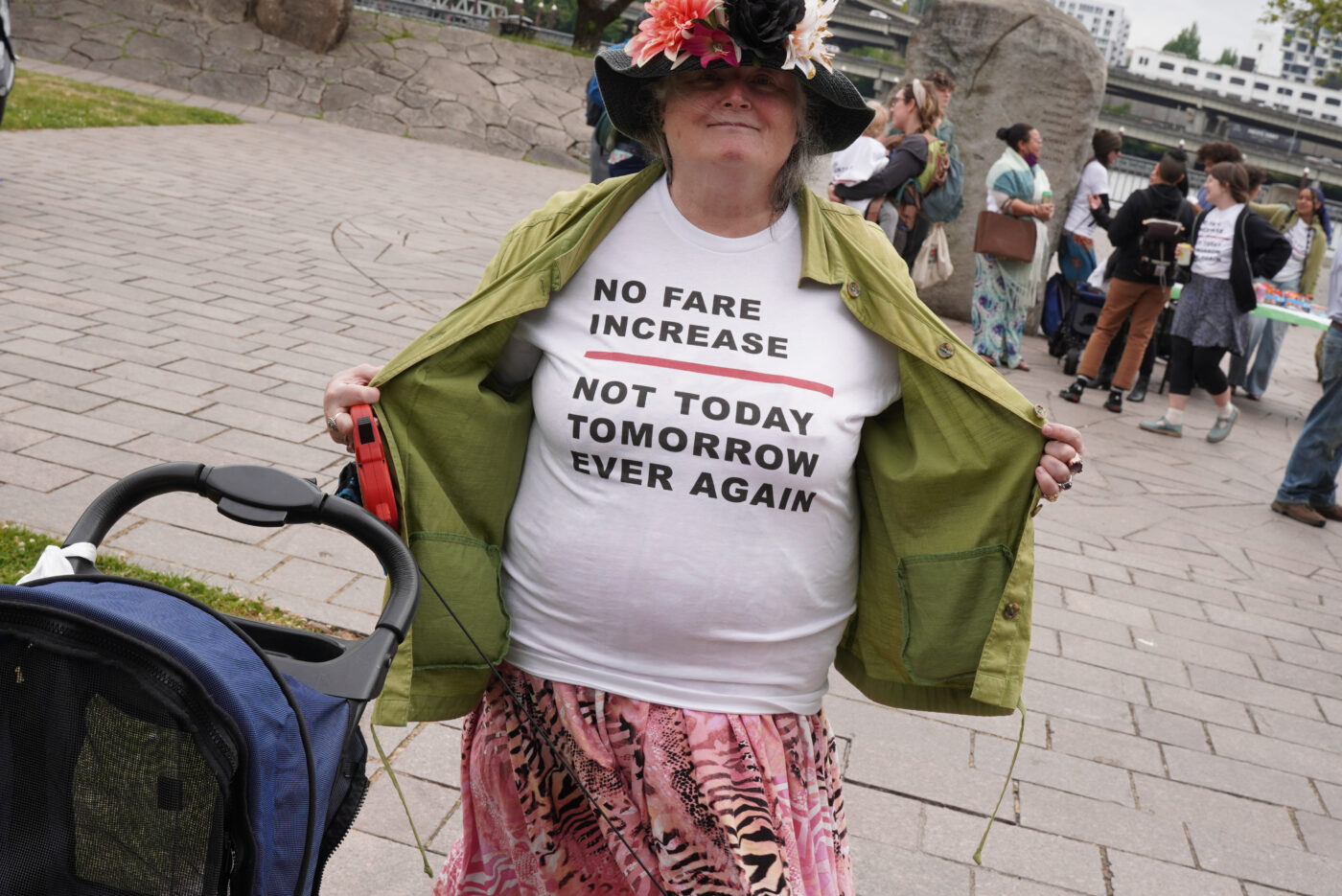
“I’m really, really concerned that this price increase is not going to do anything to address the stagnancy that we see in ridership… And I don’t think any of us are really realizing that public transit is a key problem-solver in the climate crisis that we’re currently facing… I feel like TriMet needs to be a major player in getting people out of their dang cars and onto our buses and our trains! I really feel very passionately that we need to be a bolder leader in addressing the climate crisis… There are a lot of issues I think in our current service and what we’re trying to deliver to the public, that I just feel like it’s not really meeting my expectations as a board member.
I don’t think that we need to do this right now. It’s not the right timing. And we need to really listen to the community, so I’m going to be voting with my heart and my conscience and I’m going to be a no.”
All of the other board members voted in favor of the fare hike.
Board Member Thomas Kim (Washington County) said he agreed with the testimony of Rep. Pham but that, “The current urgent financial reality is that until we can treat the funding issue, we need that band-aid… But I assure you that we will not be wearing the band aid forever.”
The boos and shouts from people in the audience picked up with each successive vote.
Board Vice President Lori Bauman (Southeast Portland) made her case by saying the new rate of $2.80 for a 1-day pass is equivalent to the 35-cent riders paid in 1969: “The ordinance simply keeps fares at the same level they were 50 years ago based on the purchasing power of the dollar.” That comment elicited so many shouts from the crowd that Board President Linda Simmons had to issue a warning.
“If you are disruptive or interfere with any of us talking,” Simmons said. “This meeting will be recessed and go virtual so that you won’t actually be present when the vote is taken.”
“So you don’t respect the people?!” someone shouted.
“You don’t respect our voice. We’re volunteers and we showed up, but we can’t do our job if you don’t let us speak,” Simmons countered, and then she got up and walked out with the rest of the board to a nearby room where the meeting continued online.
Protestors then marched down a hallway chanting, “Fare increases aren’t fair! Be fearless, go fareless!” and packed into a crowd right outside the closed-door room where board members holed up. Security guards stood in front of the door. After a few minutes a man walked out and tried to reason with the protestors, saying that they’d like to come back to the main meeting room to hold the vote, but only if protestors agreed to not “get too threatening” or push forward toward board members.
It quickly became clear that a truce could not be struck, so the board remained in the private room and beamed the meeting onto screens in the larger venue.
In the hallway, OPAL Executive Director Lee Helfend addressed the crowd:
“Did any of you vote for these board members?” they asked.
“No!” the crowded replied.
“Today we’re voting on a fare increase. Are any of you in support of a fare increase today?”
“No!”
“That is your vote. That is the vote that’s happening today!”
When it became clear the board would not return to the main meeting room, protestors walked to the front of the room and took the seats formerly occupied by the board. They held signs and there was an awkward tension as several TriMet staff and other members of the public who came to the meeting but were not part of the protest, were still in the audience.
A large group of protestors continued to chant and pound on the walls outside the private meeting room as the meeting continued on screens.
Board Member Ozzie Gonzalez was last to speak and he denounced the protestors. Gonzalez also accused some of them of being paid antagonists. “I’m really disappointed that right now we’re confusing democracy by having paid advertising brought to the public forum,” Gonzalez said during his official remarks. “I think we’re tarnishing the premise of democracy. And I believe that anybody who’s a tax-exempt organization needs to be very careful when they’re leaning into tax policy in this way.”
Gonzalez also had choice words for Portland Mayor Ted Wheeler, who sent a letter to the TriMet Board early this week urging them to not raise fares as part of his push against a “collective tax burden” he says is causing people to flee Portland. “This Monday morning quarterbacking happening from our public agency partners isn’t helping either,” Gonzalez said. “I’m severely disappointed in how absent they are when it’s time to come up with solutions, and how it’s some sort of political protection to tell us what they think we should be doing.”
The final act of the protestors was to wait outside the closed meeting room door for each board member to leave. Escorted by security officers, the board members were hit with yells of “Coward!” and “Shame!” as they hastily made their way out of the building.
It was a wild meeting that reveals many political and policy fault lines that we will certainly hear more of in the coming months and years.
For videos and a live play-by-play, check out my Twitter thread shared during the meeting.
Also note that Youth, Honored Citizen and Adult monthly and annual passes will not be increased. The increase for all other fares will go into effect January 1st, 2024. Learn more about the fare increase and TriMet’s budget on their website.
